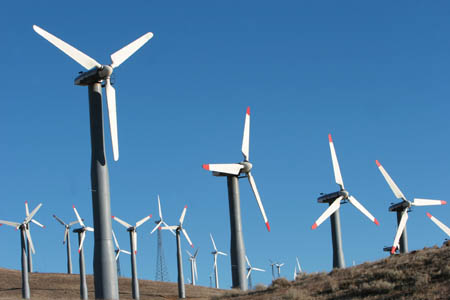Lights. Camera. Energy.
The Sierra Club Energy Festival

You walked to the Earth Day Festival and swapped your incandescent light bulbs for compact fluorescents. You’re carpooling to work and biking to your errands with renewed zeal. You’ve sworn to reduce your carbon footprint and learn how to implement sustainable energy resources into your daily life.
If you’re inspired by all the activities of Earth Day and want to learn more about how you personally can reduce air pollution and global warming, then walk, bike, or ride the bus over to the Unitarian Society on Saturday, April 28, for a dynamic mix of films that provide the inspiration and blueprint for building a sustainable energy future.
The Sierra Club Energy Film Festival, co-presented by the Los Padres Chapter of the Sierra Club and the Unitarian Society’s “Green Team,” will feature acclaimed documentaries about energy production and conservation, wind energy, how to be fossil free by 2033, what other communities are doing to reduce global warming, and who really pays the price for driving. The festival, launched in the fall of 2006, continues into 2007 with a particular emphasis on Earth Day and what can be done practically to combat global warming. Each movie will be followed by a Q&A session with expert panelists.
In between screenings, wander out to the patio for refreshments and learn how to reduce your own energy consumption at the information tables. Check out the sweet options at the Santa Barbara Electric Bike exhibit, ask energy-conserving builders Allen Associates how to do a green remodel, and learn ways to diminish the impact of your work commute from the Traffic Solutions booth. There will also be a bicycle repair stand, an MTD bus pass giveaway, two-for-one tickets on Amtrak’s Pacific Surfliner, and more. Donations will be accepted to support the important work of the Sierra Club, but admission to the festival is free.
Power of Community: How Cuba Survived Peak Oil (4 p.m.) With the loss of access to Soviet oil in 1990, Cuba was forced to undergo an artificial “peak oil” crisis. This uplifting documentary explores how the island nation, through its focus on cooperation, conservation, and community, managed not only to survive the loss of Soviet oil supplies but to transform its entire society to a sustainable, low-energy-use system. (50 min.) Q&A with Chris and Tierriana Casebeer, frequent visitors to Cuba and energy conservation advocates.
Kilowatt Ours (5:20 p.m.) This film invites viewers to help build a net-zero nation by conserving energy to the greatest extent possible at home, then using clean renewable energy for electricity. The film opens with Vice President Dick Cheney’s energy policy speech in which he claims that America needs 1,900 new power plants in the next 20 years to meet projected electricity demands. From there, filmmaker Jeff Barrie takes viewers on a journey from the coal mines of West Virginia to the solar panel fields of Florida, discovering practical solutions to America’s energy-related problems. He and his wife, Heather, share a plan to eliminate their use of coal and nuclear power at home by employing energy conservation, energy efficiency, and renewable energy sources-ultimately saving hundreds of dollars annually on energy bills and using a portion of the savings to purchase renewable energy. (38 min.) John Perlin, award-wining author on solar energy, will host the Q&A.
Fossil Free by ’33 (6:30 p.m.) Learn how Santa Barbara’s Community Environmental Council has plans for us to be using fossil-free fuels by the year 2033. Think it can’t be done? Check out how CEC uses available technologies, fuels, and practices in lieu of pollution-causing fossil fuels, and is challenging the tri-county region to set an example for our nation and the world by ending its dependence on fossil fuels by meeting its needs through conservation and the use of renewable resources such as solar, wind, and wave energy. (30 min.) The CEC’s Ivor John will host the Q&A.
Autos on Welfare (7:30 p.m.) While most motorists think that their gas taxes and registration fees pay for roads and related costs, the truth is that car-driving is heavily subsidized by the government, which in turn means higher taxes for everyone. Those who don’t drive are paying for those who do. S.B. social activist Robert Bernstein explains “natural capitalism” in this surprising look at who pays for car usage and its hidden subsidies, as well as the hidden costs to run them. (12 min.) Bernstein will host the Q&A
4•1•1
The Sierra Club Energy Film Festival is Saturday, April 28, 4-8 p.m. at the Unitarian Society’s Jefferson Hall, 1535 Santa Barbara Street. See sierraclub.org/scp/filmfest/, call 962-8415, or email dlittlejohn1@cox.net.



